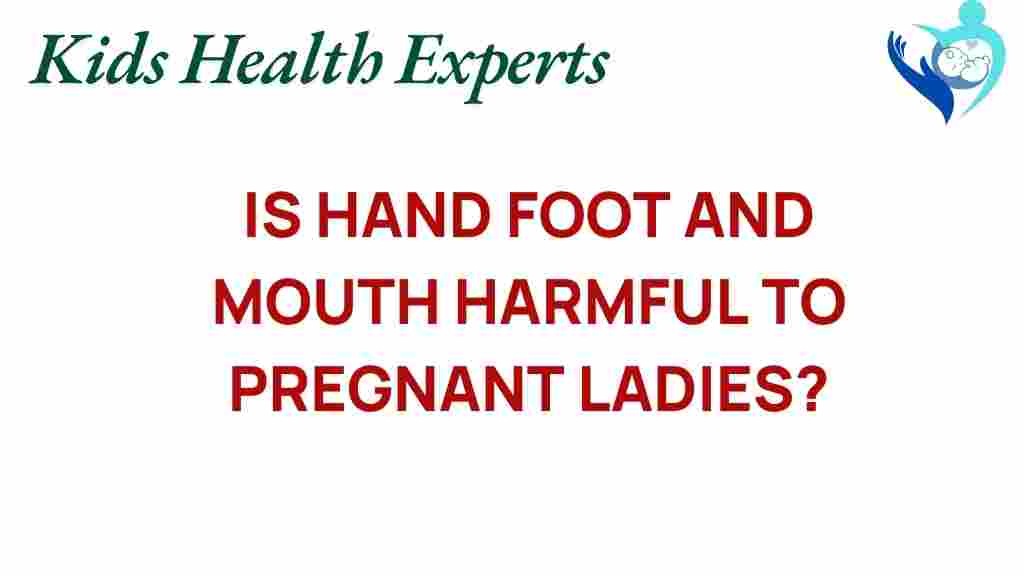Unraveling the Risks: Is Hand, Foot, and Mouth Disease Harmful to Pregnant Women?
Hand, Foot, and Mouth Disease (HFMD) is a common viral infection that primarily affects young children. However, pregnant women may wonder about the implications of this disease on their health and the safety of their unborn child. This article delves into the pregnancy risks associated with hand, foot, and mouth disease, exploring its effects on maternal health, viral infections, and infant safety. We will also provide valuable insights on disease prevention and the importance of public health measures in mitigating risks.
What is Hand, Foot, and Mouth Disease?
Hand, foot, and mouth disease is caused by several viruses, most commonly the coxsackievirus. It is characterized by:
- Fever
- Sore throat
- Painful sores in the mouth
- Rash on the hands and feet
HFMD spreads easily through direct contact with infected individuals, surfaces, or objects. While it is primarily seen in children under five years old, adults can also contract the virus.
Understanding the Pregnancy Risks
When it comes to pregnancy risks, it’s essential to understand how infections like HFMD can affect both the mother and the baby. Here are some key points to consider:
- Transmission: HFMD is typically not transmitted to the fetus. However, if a pregnant woman contracts the virus, it could lead to complications if her immunity is compromised.
- Maternal Symptoms: Pregnant women may experience more severe symptoms due to hormonal changes and a weakened immune system.
- Infant Safety: There is limited evidence suggesting that HFMD can affect the infant negatively at birth, but close monitoring is advised.
How Hand, Foot, and Mouth Disease Affects Maternal Health
The effects of hand, foot, and mouth disease on maternal health can vary from woman to woman. Some women may experience mild symptoms, while others may face more severe challenges. Here are the main health concerns:
- Dehydration: Painful sores in the mouth can make it difficult for pregnant women to eat or drink, potentially leading to dehydration.
- Secondary Infections: The presence of sores increases the risk of bacterial infections, which can complicate pregnancy.
- Emotional Stress: Dealing with illness during pregnancy can lead to increased anxiety and stress, affecting overall well-being.
Is There a Risk of Complications for the Baby?
While HFMD generally does not pose a direct threat to the fetus, there are indirect risks associated with the disease:
- Preterm Labor: High fever and stress can sometimes lead to preterm labor.
- Low Birth Weight: Severe illness that affects the mother’s nutrition can result in low birth weight.
- Transmission during Birth: If a mother has HFMD at the time of delivery, there is a slight risk of transmitting the virus to the newborn.
Viral Infections and Pregnancy: A Broader Perspective
Pregnancy is a critical time for a woman’s immune system. Viral infections can pose various risks, including:
- Increased Susceptibility: Pregnant women may be more susceptible to infections, making it essential to practice good hygiene.
- Impact on Immune Response: Hormonal changes can alter immune responses, potentially making infections more severe.
- Other Viral Infections: Besides HFMD, other viruses such as influenza and Zika can also impact pregnancy outcomes.
Steps to Protect Against Hand, Foot, and Mouth Disease
Preventing hand, foot, and mouth disease is crucial for pregnant women and their families. Here are some effective strategies:
- Practice Good Hygiene: Regular handwashing with soap and water is essential.
- Avoid Close Contact: Keep distance from infected individuals, especially young children.
- Clean and Disinfect: Regularly clean surfaces and objects that may be contaminated.
Disease Prevention and Public Health Measures
Public health initiatives play a vital role in controlling the spread of infectious diseases, including HFMD. Here are some measures that can be taken:
- Education: Raising awareness about HFMD symptoms and prevention methods in communities.
- Vaccination: While there is no specific vaccine for HFMD, vaccination against other viral infections can help protect pregnant women.
- Surveillance: Monitoring outbreaks and providing timely responses to control the spread of illness.
Troubleshooting Tips for Pregnant Women
If you suspect you have contracted hand, foot, and mouth disease during pregnancy, consider the following troubleshooting tips:
- Consult Your Healthcare Provider: If you experience symptoms, seek medical advice promptly.
- Stay Hydrated: Drink plenty of fluids to prevent dehydration, especially if you have mouth sores.
- Rest and Recover: Ensure you get enough rest to support your body’s recovery process.
Conclusion
In conclusion, while hand, foot, and mouth disease is primarily a concern for young children, it can also impact pregnant women. Understanding the pregnancy risks, maintaining good maternal health, and implementing effective disease prevention strategies are essential for the safety of both mother and baby. By being proactive and informed, pregnant women can minimize their risks and contribute to the overall public health efforts to control viral infections.
For more information on maternal health during pregnancy, visit this resource. If you’re looking for tips on preventing other viral infections, check out this article.
This article is in the category Conditions and created by KidsHealthExperts Team
